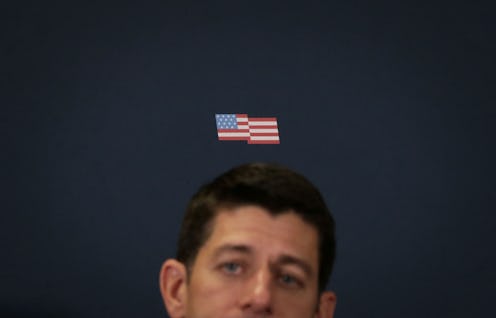News
What Paul Ryan Might Be Thinking About Trump's Win
This has not been an easy speakership for Paul Ryan. He's been trying to lead the Republican party as Donald Trump seems to be forcing its implosion. Every time he mentions reforming this or improving that, Trump insults Mexicans, Muslims, or women. The GOP establishment has been so concerned that it's even put forward Ryan's name as a possible nominee in the event of a contested Republican National Convention this July. But he's not having it — and it might be because Paul Ryan would rather run in 2020 instead. It's not so much about supporting Trump as setting the stage for himself in four years. Update: Ryan refused to endorse Trump in an interview Thursday with CNN's Jake Tapper, saying that he just "wasn't ready."
Ryan said he wouldn't be the 2016 GOP nominee back in March. That hasn't changed. In an article for Roll Call, Stuart Rothenberg lays out what Republican strategists see as the true endgame for Ryan, and it centers on 2020. If Hillary Clinton wins the election and the Democrats take back the Senate, he will be the top-ranking member of the GOP on Capitol Hill, and the key voice fighting Clinton and the Democrats for the next four years. Coupled with the bad taste Trump's candidacy will leave in Republican voters' mouths, Ryan will be set for swooping in as a savior for the party and the natural choice to take back the White House:
Ryan will be a more mature (and presidential) 50 years old at that point, a Wisconsin conservative who is currently regarded by conservatives as fair and trustworthy. Pragmatists, and most in the media, see Ryan as a policy wonk open to new ideas and creative approaches, not an ideologue looking for confrontation and government shutdowns. Ryan would be the perfect challenger to Clinton, then 73 years old, an unapologetic liberal and a veteran of the national political wars for close to 30 years.
That could explain everything. Why else would he support a candidate who is against GOP economic policy (close the border with Mexico), social policy (Trump is not so hateful toward LGBT folks, and once supported abortion rights), and foreign policy (pulling funding for NATO and buddying up with Russia)? Ryan is in it to win it — in four years.
Ryan hasn't said anything explicit since Trump won Indiana and Cruz dropped out, clearing the way for Trump to win the party's nomination. He did, however, post a video that seems to sum up his game plan for the general election. When he's asked who people should vote for, he'll spout off all the things that make the GOP great, and how to fix America's problems more generally. Here's what he says in the video, a snippet from a speech to Congressional interns in March:
I think the polls basically say about 7 out of 10 of Americans think that America is heading the wrong direction. Okay. Then as a member of Congress, it is not our job simply to say we are just as angry as the rest of everybody else. It is not our job just to put gas on the fire. It is our job to channel this concern, this fear, this anxiety, this anger into solutions, into ideas on how to fix it.
He goes on to say: "America, we have problems that we can fix, and we need to do this together." That sounds pretty good, right? And he didn't have to address Trump at all. This is the same route he took when talking to students at a town hall event at Georgetown University last week, as covered by Amy Davidson in The New Yorker. A student asked what he should do, given that it seems like Trump is going to win. Ryan focused on the issues.
He said not to look at the election as "a vote for a person" but rather in the abstract, as “a choice of two paths." Davidson explains it perfectly, first quoting Ryan's response to the student:
'So I would just ask you to raise your gaze and look at the horizon we’re trying to paint.' Presumably, if Maytnier raised his gaze high enough, and squinted, he’d be able to avoid seeing Donald Trump. That could be difficult in July, however, if Trump is standing on the podium at the Convention, in Cleveland, accepting the nomination.
So try as he might to keep the discussion around the GOP centered on ideas and policies, it might not be so simple. Whether Ryan's reasoning is solely based on presidential aspirations, who knows. It may help the GOP hold onto more of Congress as well. Last week, he talked about his agenda once again on MSNBC's Morning Joe . Trump of course came up. Ryan said he thinks that he and the candidates share the same principles.
Now let's see if Ryan can talk loud enough to ensure his GOP vision drowns out Trump's decisive rhetoric. The Republican party's next four years count on it.
